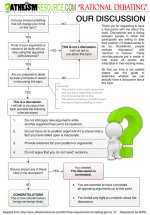For some people, their views on religion are HUGELY influential on the rest of their worldview, including their views on ethics, history, science, politics, family functioning, and so much more. So it should not be expected of anybody that if you change their religious views even minorly (and especially majorly like going from theist to atheist), it will happen immediately. Rather, they would have to basically reorient their entire life philosophy, attitudes, emotions, viewpoints, etc., and that (not always, but often) takes a major amount of time and effort. I do not think we should fault them for not overhauling their entire worldview in such a quick span. Rather, we should be patient and understanding, and try to help them if we can, not taunt or tease them.
Thinking of my own personal history of changing views on different subjects (some big changes, some small ones), I was, and still am, more likely to change them on-the-spot when it would not impact much of the rest of my worldview. If it would have significant ripple effects though, then I would want to research it all a bit more first. That is not only more understandable when other people have a similar perspective, but also seems more reasonable. I would not want to live in a world where people regularly overhauled their entire life philosophy if they came across some minor apparent flaw in it. Sometimes I have found what seemed to be flaws in my beliefs through someone else criticizing them, later investigated the criticism a bit more, and then discovered some flaw in the criticism that I had not originally seen. Sometimes then my own beliefs turned out to be right, sometimes they turned out to be wrong still for some other reason that became apparent. But if I was going to tell someone that I was willing to drop my atheism views and convert to theism on-the-spot if they had some apologetic that I could not immediately find fault in, that would be an unwise position to take. We should not fault theists for not taking that sort of position either in the reverse direction.
Brian


